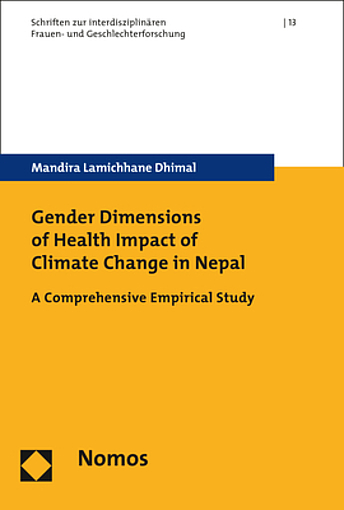englischEnvironmental and climatic changes affect the livelihood and health of human beings both directly and indirectly. The aim of this study is to explore the health impacts of environmental and climatic change from gender perspectives in Nepal, using a combination of gender, feminist, social ecology and social epidemiological theories, including the place-based approach of environmental health relationships. A mixed methods research design is used in the study. The methods used to collect data include a review of existing research literature, focus group discussions and questionnaires, interviews with key players and focus group discussions with members of the community, and interviews with experts and key policymakers. The study reveals that the level of understanding about climate change varies from one geographical region to another (place of dwelling) and is also influenced by other sociocultural factors, among which are gender, ethnicity and age. An analysis of both qualitative and quantitative data indicates a difference in access to and control over health protection resources, participation in policymaking processes, and a greater burden for females in terms of work, which places them at greater risk of experiencing health problems due to environmental and climatic change.
Die Veränderung der Umwelt sowie der Klimawandel haben direkte und indirekte Auswirkungen auf die Lebensgrundlagen und die Gesundheit von Menschen. Das Ziel der Studie ist es, die gesundheitlichen Folgen in Nepal durch die Veränderung der Umwelt und den Klimawandel aus einer Gender-Perspektive zu erforschen. Dabei kommt eine Kombination aus gender-, feministischen-, sozialökologischen sowie sozial-epidemiologischen Theorien zum Einsatz. Die Studie bedient sich eines Mixed-methods-Designs.
Die Daten wurden mit Hilfe von Literaturbesprechungen, Diskussionsgruppen, Fragebögen, Interviews mit zentralen Akteuren wie Experten und Politikern, sowie Diskussionen mit Gemeindemitgliedern erhoben. Die Studie zeigt auf, dass das Verständnis über den Klimawandel je nach Region und Lebensmittelpunkt unterschiedlich ist. Zudem wird das Verständnis durch soziokulturelle Faktoren wie Geschlecht, Ethnizität und Alter beeinflusst.
Die Analyse von qualitativen und quantitativen Daten zeigt Differenzen im Zugang und in der Kontrolle von gesundheitsschützenden Ressourcen, der Teilhabe an politischen Prozessen sowie eine höhere Arbeitsbelastung von Frauen, wodurch diese einem größeren Risiko bezüglich Umweltveränderungen und des Klimawandels ausgesetzt sind.


